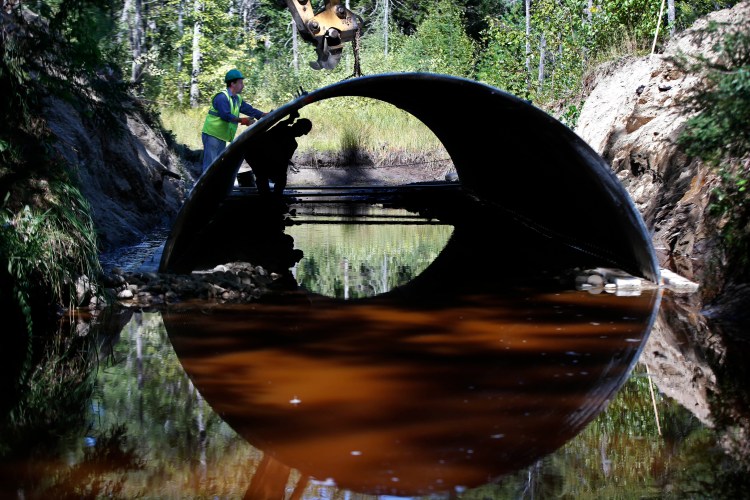The U.S. Department of Agriculture has awarded $6 million to a Maine project to reduce the impact of flooding on roads and restore critical habitat for Atlantic salmon and Eastern brook trout.
The Maine Aquatic Connectivity Restoration Project, a partnership led by The Nature Conservancy, will help private forestland owners reduce the impact of flooding on road networks and restore more than 250 miles of fish habitat in northern and eastern Maine. The project is one of 88 projects across the country that will receive $225 million in federal funding through the U.S. Department of Agriculture’s Natural Resources Conservation Services, the department announced Wednesday.
“With over 11 million acres of Maine forest in private hands, this project stands ultimately to influence stream-friendly management on thousands of miles of some of the best aquatic habitat in the east and spur innovations and efficiencies to influence restoration even more broadly nationally as we and our partners share lessons from this project,” Kate Dempsey, state director of The Nature Conservancy in Maine, said in a prepared statement.
The five-year project aims to replace several hundred culverts, restoring 250 miles of brooks, streams and rivers in more than a dozen priority watersheds. The project area includes the last endangered Atlantic salmon listed watersheds and some of the highest quality Eastern brook trout habitat remaining in the United States. Fragmented aquatic habitat is a primary threat to both species.
The partnership includes two dozen entities, including Project SHARE, Maine Audubon, Atlantic Salmon Federation, Appalachian Mountain Club, Penobscot Indian Nation, Houlton Band of Maliseets and the Passamaquoddy Indian Nation.
Senators Susan Collins and Angus King and Rep. Bruce Poliquin wrote a joint letter of support for the initiative.
“The project represents the very best of Maine – environmental stewardship combined with economic growth and driven by innovative collaboration – all of which once again shows that, in Maine, preserving our environment and building our economy go hand-in-hand,” King said in a statement.
Poliquin said the state’s fisheries and coastal habitats are key parts of Maine’s identity and provide “thousands of jobs through tourism, harvesting and other critical industries.”
Send questions/comments to the editors.




Success. Please wait for the page to reload. If the page does not reload within 5 seconds, please refresh the page.
Enter your email and password to access comments.
Hi, to comment on stories you must . This profile is in addition to your subscription and website login.
Already have a commenting profile? .
Invalid username/password.
Please check your email to confirm and complete your registration.
Only subscribers are eligible to post comments. Please subscribe or login first for digital access. Here’s why.
Use the form below to reset your password. When you've submitted your account email, we will send an email with a reset code.